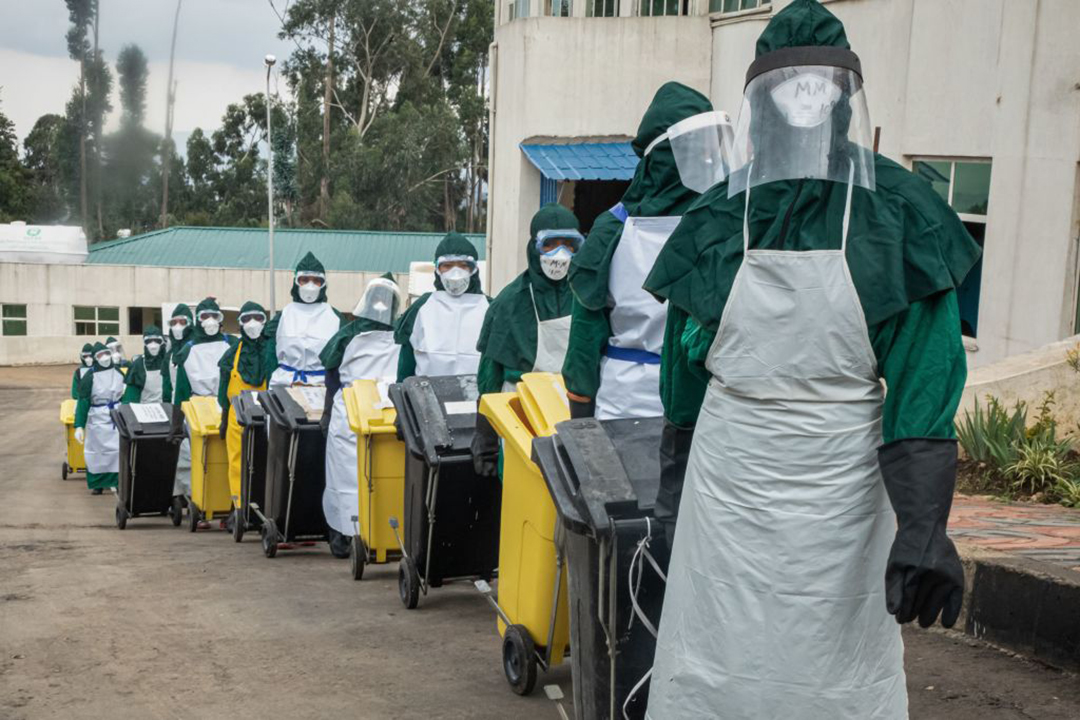Africa’s COVID-19 Waste Is Piling Up
ADF STAFF
Kenyan entrepreneur Catherine Wanjoya was watching the news one evening when she saw a mess in need of cleaning: tons of COVID-19 medical waste is clogging already overburdened landfills in Africa.
“Somebody had collected some used masks, washed them and was even selling them,” she said, recalling the news story in an interview with the BBC. “When we dispose our used masks and other PPE (personal protective equipment) in a way that is not responsible, they end up being handled by other people. They could get infected, go infect their families and the spread still continues.
“We saw a problem we needed to solve.”
Managing the extra medical waste caused by the pandemic has become a problem for the entire continent.
Before COVID-19, Africa produced an estimated average of 282,000 tons of medical waste annually, according to a 2021 waste management report published by Sage, an online research journal.
During the pandemic, many African countries have reported significant increases in medical waste, some as much as five times more.
The issue recently prompted a response from the World Health Organization’s (WHO) Regional Office for Africa.
“WHO is engaging in multi-sectoral efforts to effect changes in waste management systems in Africa,” WHO technical officer Claude Mangobo said in a statement. “It is a critical process that we are committed to for the health of the continent and its people.”
Inpatient facilities caring for COVID-19 patients produce about 2.5 kilograms of waste per day, according to the Africa Centres for Disease Control and Prevention (Africa CDC).
Nearly 353 million single-use face masks are thrown away every day in sub-Saharan Africa (about 10.5 billion per month), according to a Ghanaian study published in the January 2022 edition of the international journal Environmental Challenges.
“It is absolutely vital to provide health workers with the right PPE,” said WHO Health Emergencies Programme Executive Director Dr. Michael Ryan in a February 2022 statement. “But it is also vital to ensure that it can be used safely without impacting on the surrounding environment.”
To continuously monitor waste management, the WHO will administer an online questionnaire every quarter.
The Africa CDC published waste management protocols in January 2022, but further studies continue to highlight the problem.
A recent WHO assessment of 10 African countries showed that just four scored high in managing COVID-19 waste, which includes handling used syringes, storing and removing safety boxes, recording needle stick injuries, and managing waste storage areas.
In February, a WHO report on global health care waste during the pandemic found that 60% of health care facilities in the least developed countries are not “equipped to handle existing waste, let alone the additional COVID-19 load.”
Among the WHO’s recommendations are properly designed incinerators and engineered sanitary landfills.
“Measures such as burning waste in an isolated pit or safe burial on hospital premises are preferrable to dumping indiscriminately, or worse, burning waste in a drum or in the open, causing toxic emissions,” the WHO stated.
In Kenya, Wanjoya’s solution was to retrofit her business, Genesis Care, which previously specialized in the disposal of sanitary products. She reworked her company’s small incinerators to also burn masks and gloves.
Genesis Care, which works with small clinics that can’t afford large medical incinerators, now builds small incinerators that can burn as many as 80 masks a day and larger incinerators that can handle 20 kilograms of PPE waste per day.
She hopes to partner with the Kenyan government to ensure that clinics can burn medical waste and prevent landfill use.
“If we do it [incinerate PPE] at the source, they will not even get to such people who would use them and resell them to people who are not even suspecting,” Wanjoya said. “When it comes to these masks we are just throwing away, we are able to take care of this boy or this girl who are scavenging through the waste to try and get something valuable to go and sell, just to put food on the table for their family.
“For me, it’s all about impact — making sure that we make a difference in somebody’s life.”


Comments are closed.